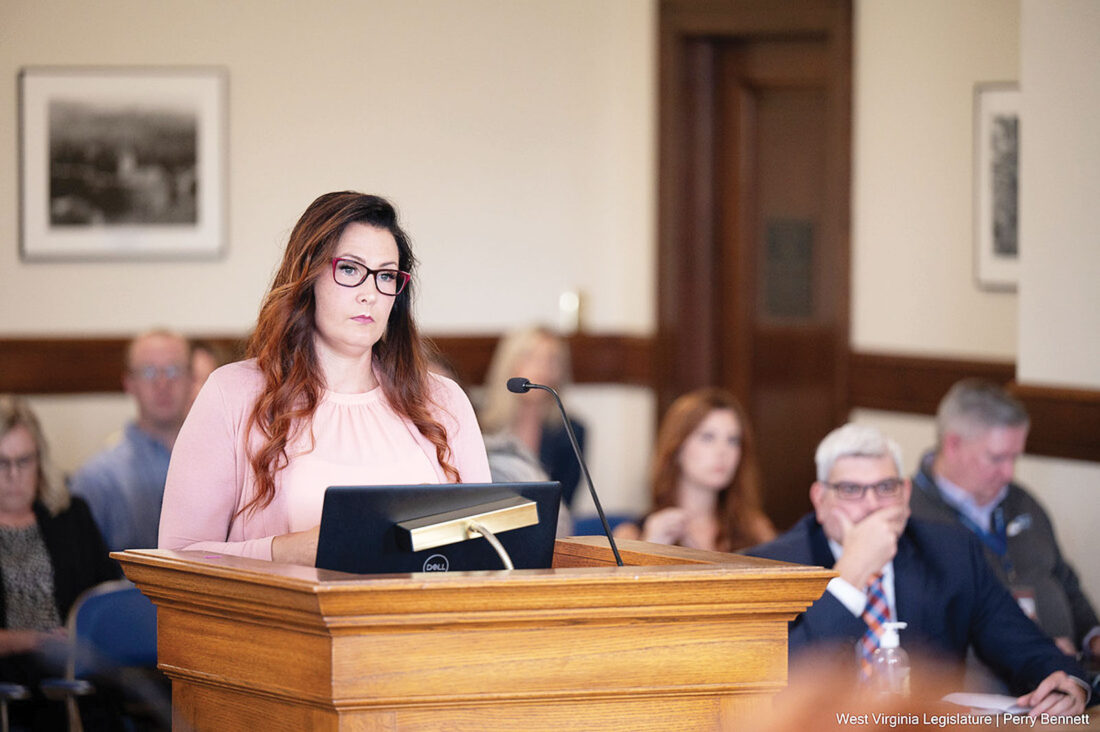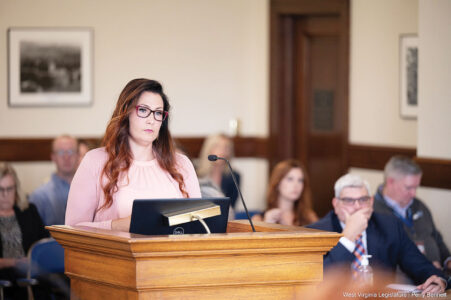Lawmakers receive updates on child welfare online services

Department of Human Services Deputy Commissioner of Policy and Programs Kendra Boley Rogers walked lawmakers through West Virginia’s performance-based contract program for child placement agencies during a Sunday interim meeting. (Photo Courtesy/WV Legislative Photography)
CHARLESTON — Members of a West Virginia Legislature interim committee Sunday received updates on systems meant to hold child placement agencies accountable and provide better communication between the state and foster families.
The Joint Committee on Children and Families met Sunday afternoon for the first day of September legislative interim meetings at the State Capitol Building. Members received a report from Kendra Boley Rogers, the deputy commissioner for policy and programs at the Department of Human Services, on performance-based contracts for child placement agencies.
House Bill 2010, passed in 2019, made several reforms to the state’s foster care system, including the creation of performance-based contracting for child placement agencies.
“We have specific measures. Four of the performance measures that we have in place are actually tracked,” Rogers said. “Those are tied to federal requirements for some of our youth and just other practice initiatives and things that we track.”
The performance measures include items the state is measured against during its federal review process by the Administration for Children and Families’ Child and Family Services Review through the U.S. Department of Health and Human Services.
Other measures include tracking recruitment and retention of foster parents by the child placement agency, as well as length of time a family has provided foster care. The performance measures are based on what is within the control of the agency, ensuring accountability for controllable outcomes. Agencies can receive a $1,000 incentive for each adoption completed within six months post-termination of parental rights.
State code required the former Department of Health and Human Resources, now DoHS, to enter into performance-based contracts by Dec. 1, 2020. Child placement agencies are required to submit monthly performance measures to the department. The contracts are designed for data collection and to implement corrective measures, with an eventual goal of tying reimbursement rates to performance.
“They submit their data to us monthly based on those performance measures,” Rogers said. “And so quarterly, we meet with them, we discuss their performance.
“If they’re falling below the bench line that’s been established for the four performance measures, then we give them a quarter to get those numbers back up,” Rogers continued. “At that point, at the next quarterly meeting, if they are not up to the benchmark, then we work on a corrective action plan with the agency based on whatever the performance is that they’re not meeting.”
An annual report on agency performance, including information on corrective action plans, has been submitted to the Legislature since fiscal year 2022. That report is due Dec 31. Rogers said out of 10 child placement agencies, two are under corrective action plans: one for not meeting visitation benchmarks and the other for not completing certain assessments within the required timeframe.
DoHS Chief of Technology and Information Brandon Lewis provided lawmakers an update on the state child welfare electronic portal.
The Communication and Operations Mobile Engagement Tool, or C.O.M.E.T., officially went online at the beginning of the month, first in Randolph County. Phase one of the project was supposed to be ready by July 1, but DoHS officials informed lawmakers in December that they would need until September.
House Bill 4975, passed by the Legislature in 2024, required DoHS to create a web-based communication system for use by foster parents, kinship parents and staff of the Bureau for Social Services, pulling data from DoHS’ West Virginia People’s Access to Help (WV PATH) system.
C.O.M.E.T. is supposed to provide information regarding visitation, appointments, travel and other services available to a foster child; information regarding court hearings and meetings with guardians ad litem and multidisciplinary teams; health records for the foster child to the foster parent or kinship parent; and other communications.
The vendor for C.O.M.E.T., Cardinality AI, was able to complete phase one by July 22, but the system was not officially brought online until last Tuesday. Lewis said the accelerated timeline was made possible by securing federal funding. The state is in a five-year contract with Cardinality AI for $5.4 billion.
Randolph County was the first to go live. C.O.M.E.T. will be rolled out to Monongalia, Wirt, Putnam and Mason counties next, with a gradual statewide rollout planned over the next two to three months.
Committee Co-Chairman Adam Burkhammer, R-Lewis, was the lead sponsor of the bill that created C.O.M.E.T. A foster parent himself, Burkhammer said C.O.M.E.T. could help improve foster care services in the state.
“I’m very excited for this system,” he said. “I think this will set the stage for things going forward for other systems that we implement. I believe it can be a game changer for every aspect of child welfare.”
Sen. Eric Tarr, R-Putnam, was also optimistic about C.O.M.E.T., but reminded committee members that WV PATH went way past its deadlines and the implementation cost nearly doubled.
“If I recall, (WV PATH) was supposed to have been $170 million and it turned into a $308 million useless machine for several years,” Tarr said.





